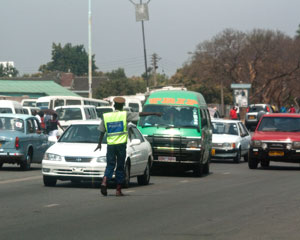
THE Zimbabwe Tourism Authority (ZTA) chief executive officer Karikoga Kaseke will approach police chief, Augustine Chihuri to discuss the many roadblocks on the country’s major highways, which now pose a threat to the growth of the tourism industry.
REPORT BY MUSA DUBE
Kaseke last week said he would formally present complaints from travellers who allege harassment by traffic officers on the country’s highways.
“The police commissioner general has allowed me to go to his office and suggest how best we can solve the problem. I hope by the end of this month after the Independence holiday, I will meet him and present to him what the tourism industry thinks should happen,” he said.
“There are a number of suggestions from ZTA on how best the issue of roadblocks can be resolved.”
Kaseke said the industry had received complaints from travellers who have narrated their ordeals at the hands of traffic officers.
Last year President Mugabe castigated corrupt traffic police officers for soliciting bribes from motorists.
Bulawayo-based economic commentator Eric Bloch last week said the tourism sector had a potential to revive the economy “if we get it right, like ensuring that tourists are not delayed and harassed while travelling”.
- Chamisa under fire over US$120K donation
- Mavhunga puts DeMbare into Chibuku quarterfinals
- Pension funds bet on Cabora Bassa oilfields
- Councils defy govt fire tender directive
Keep Reading
“We need to have a means of traffic control. For tourists to travel from Beitbridge to Victoria Falls, and be stopped for as many as 18 times on these roadblocks, is not good,” said Bloch.
“We should have a system that when a vehicle has been stopped, checked and has been cleared, it should be given a dated sticker so that it can be waved through on other roadblocks on that day.”
He also said “the excessive amount of roadblocks and the irrationality of demands at those roadblocks were denting the country’s strides in becoming the prime tourist destination”.
Bloch added that the congestion at the Beitbridge border post was also a deterrent to the tourism industry’s recovery and needed to be dealt with.
Kaseke said ZTA had set up a board to carry out comprehensive research on the impact of the challenges being faced by tourists passing through the Beitbridge border post.
“We think by mid-May we would have compiled our report. We can only estimate the impact on what is happening at Beitbridge, but we want a scientific report on the impact on tourism,” he said.











